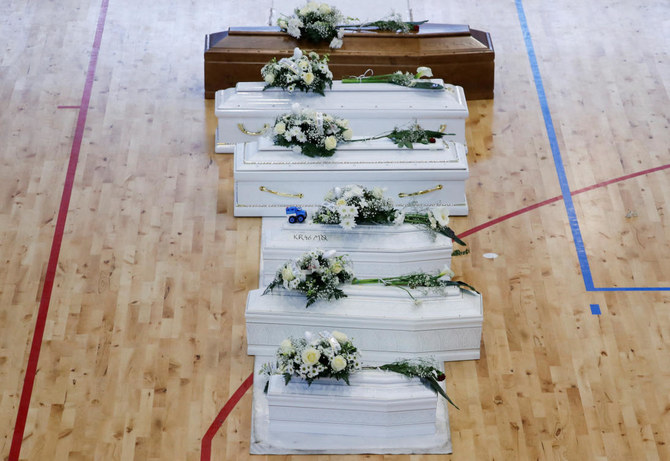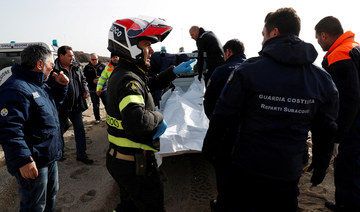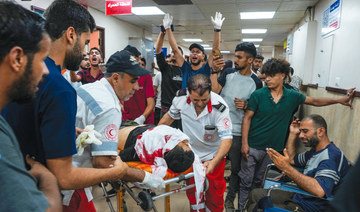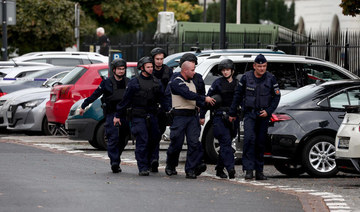CROTONE: Rescue teams pulled more bodies from the sea on Tuesday, bringing the death toll from Italy’s latest migration tragedy to 65, as prosecutors identified suspected smugglers who allegedly charged 8,000 euros (nearly $8,500) for each person making the “voyage of death” from Turkiye to Italy.
Authorities delayed a planned viewing of the coffins to allow more time for identification of the bodies, as desperate relatives and friends arrived in the Calabrian city of Crotone in hope of finding their loved ones, some of whom hailed from Afghanistan.
“I am looking for my aunt and her three children,” said Aladdin Mohibzada, adding that he drove 25 hours from Germany to reach the makeshift morgue set up at a sports stadium. He said he had ascertained that his aunt and two of the children died, but that a 5-year-old survived and was being sheltered in a center for minors.
“We are looking into possibilities to send (the bodies) to Afghanistan, the bodies that are here,” he told The Associated Press outside the morgue. But he complained about a lack of information as authorities scrambled to cope with the disaster. “We are helpless here. We don’t know what we should do.”
At least 65 people, including 14 minors, died when their overcrowded wooden boat slammed into shoals 100 meters (yards) off the shore of Cutro and broke apart early Sunday in rough seas. Eighty people survived, but many more are feared dead since survivors indicated the boat had carried about 170 people when it set off last week from Izmir, Turkiye.
Aid groups at the scene have said many of the passengers hailed from Afghanistan, including entire families, as well as from Pakistan, Syria and Iraq. Rescue teams pulled two bodies from the sea on Tuesday, bringing the toll to 65, police said.
Premier Giorgia Meloni sent a letter to European leaders demanding quick action on the continent’s longstanding migration problem, insisting that migrants must be stopped from risking their lives on dangerous sea crossings.
“The point is, the more people who set off, the more people risk dying,” she told RAI state television late Monday.
Meloni’s right-wing government, which swept elections last year in part on promises to crack down on migration, has concentrated on complicating efforts by humanitarian boats to make multiple rescues in the central Mediterranean by assigning them ports of disembarkation along Italy’s northern coasts. That means the vessels need more time to return to sea after bringing migrants aboard and taking them safely to shore.
But aid groups’ rescue ships don’t normally operate in the area of Sunday’s shipwreck, which occurred off the Calabrian coast in the Ionian Sea. Rather, the aid groups generally operate in the central Mediterranean, rescuing migrants who set off from Libya or Tunisia — not from Turkiye in the eastern Mediterranean.
Crotone prosecutor Giuseppe Capoccia confirmed investigators had identified three suspected smugglers, a Turk and two Pakistani nationals. A second Turk is believed to have escaped or died in the wreck.
Italy’s border police said in a statement that organizers of the crossing charged 8,000 euros (around $8,500) each for the “voyage of death.”
Interior Minister Matteo Piantedosi pushed back at suggestions that the rescue was delayed or affected by government policy discouraging aid groups from staying at sea to rescue migrants.
The EU border agency Frontex has said its aircraft spotted the boat off Crotone at 10:26 p.m. Saturday and alerted Italian authorities. Italy sent out two patrol vessels, but they had to turn back because of the poor weather.
Piantedosi told a parliamentary committee that the ship ran aground and broke apart at around 5 a.m. Sunday.
“There was no delay,” Piantedosi told Corriere della Sera. “Everything possible was done in absolutely prohibitive sea conditions.”
The Italian Coast Guard issued a statement on Tuesday saying Frontex had indicated that the migrants’ boat was “navigating normally” and that only one person could be seen above deck.
It added that an Italian border police vessel, “already operating in the sea” set out to intercept the migrant boat.
“At about 4:30 a.m., some indications by telephone from subjects on land, relative to a boat in danger a few meters from the coast, reached the Coast Guard,” the statement said.
At that point, a Carabinieri police boat which had been alerted by border police “informed the Coast Guard about the shipwreck.”
In contrast to similar cases of migrant vessels in distress, “no phone indication ever came from migrants aboard” to the Coast Guard, the statement noted.
Not rarely, migrants aboard a vessel in distress contact Alarm Phone, a humanitarian support hotline which relays indications of boats in trouble in the Mediterranean to maritime authorities.
When briefing lawmakers, the interior minister cited figures supporting Italy’s long-held frustration that fellow European Unions nation don’t honor pledges to accept a share of asylum-seeking migrants who reach Italy.
Piantedosi said that while these pledges covered some 8,000 migrant relocations from June last year through this month, only 387 people actually were transferred to other EU nations, with Germany taking in most of them.
Italy: Migrants paid 8,000 euros each for ‘voyage of death’
https://arab.news/4gwbj
Italy: Migrants paid 8,000 euros each for ‘voyage of death’

- The overcrowded wooden boat slammed into the shoals just 100m off Italy’s Calabrian coast and broke apart
US says new UN draft on Gaza war will not help anything

- Washington, increasingly frustrated with how Israel is waging the war and its mounting civilian death toll, allowed that resolution to pass by abstaining from voting
UNITED NATIONS, United States: The United States is wary of a new UN resolution on the war in Gaza, its deputy ambassador said Wednesday, as a draft seeks an immediate ceasefire and a halt to Israel’s offensive in Rafah.
Algeria called an urgent UN Security Council meeting on Tuesday after an Israeli strike killed 45 people at a tent camp in Rafah for displaced people on Sunday, drawing international condemnation.
“We’ve said from the beginning that any kind of additional product on the situation right now probably is not going to be helpful,” deputy US envoy Robert Wood told reporters, referring to a text from the council.
“It’s not going to change the situation on the ground.”
Algeria started circulating its draft among fellow members of the Security Council after the emergency meeting.
The draft resolution, which draws on last week’s ruling by the International Court of Justice (ICJ), “decides that Israel, the occupying Power, shall immediately halt its military offensive, and any other action in Rafah.”
It also “demands an immediate ceasefire respected by all parties, and also demands the immediate and unconditional release of all hostages.”
No vote on the text has been scheduled yet.
“We don’t think another resolution is really going to change the dynamics on the ground,” said Wood.
Wood said the United States, which freely uses its veto power in the Security Council to protect Israel, believes that negotiations in the region are the proper way to achieve a ceasefire.
In Washington, White House national security spokesman John Kirby said the Algerian text is imbalanced and fails to note that “Hamas is to blame for this conflict.”
Gaza-based Hamas leader Yahya Sinwar could end the fighting right away if he agreed to a ceasefire and hostage release deal, said Kirby.
In early May indirect talks between Israel and Hamas failed to achieve a ceasefire and a hostage and prisoner release deal. Qatar, Egypt and the United States acted as intermediaries.
In a meeting on Wednesday, many members of the Security Council noted the ICJ ruling last week ordering Israel to halt its offensive in Rafah immediately.
“This council should speak out urgently on the situation in Rafah and call for an end to this offensive,” French Ambassador Nicolas de Riviere said.
The ambassador from Guyana, Carolyn Rodrigues-Birkett, said her country felt helpless “in the face of the dehumanization of a people, disregard for the rule of law and impunity.”
“When will it end? Who can make it end?” she asked.
“And yet, we cannot afford to remain silent, as too many have already been tragically silenced, forever, in this war,” said Rodrigues-Birkett.
The council has struggled to find a unified voice since the war broke out with the October 7 Hamas attack on Israel, followed by Israel’s retaliatory campaign.
The Hamas attack resulted in the deaths of 1,189 people, mostly civilians, according to an AFP tally based on Israeli official figures.
Militants also took 252 hostages, 121 of whom remain in Gaza, including 37 the army says are dead.
Israel’s retaliatory offensive has killed at least 36,171 people in Gaza, mostly civilians, according to the Hamas-run territory’s health ministry.
After passing two resolutions centered on the need for humanitarian aid to people in Gaza, in March the Security Council passed a resolution calling for an immediate ceasefire — an appeal that had been blocked several times before by the United States, Israel’s main ally.
Washington, increasingly frustrated with how Israel is waging the war and its mounting civilian death toll, allowed that resolution to pass by abstaining from voting.
France accuses allies of ‘political positioning’ in recognizing Palestinian state

- French President Emmanuel Macron said the same day he would be prepared to recognize a Palestinian state, but such a move should “come at a useful moment“
- “France is not involved in any political positioning, it is looking for diplomatic solutions to this crisis,” Sejourne added
PARIS: France’s foreign minister Wednesday accused fellow EU members Spain and Ireland of having recognized Palestinian statehood as part of “political positioning,” instead of seeking a solution to the Israeli-Palestinian conflict.
Spain, Ireland and Norway on Tuesday officially recognized the State of Palestine, sparking a furious response from Israel.
French President Emmanuel Macron said the same day he would be prepared to recognize a Palestinian state, but such a move should “come at a useful moment” and not be based on “emotion.”
Foreign Minister Stephane Sejourne told senators that France was “in favor of a two-state solution,” under which the states of Israel and Palestine would coexist in peace.
“By definition, the issue of recognition will of course come into that. But the concern now — which I have clearly shared with my Spanish and Irish counterparts — is what happens the day after recognition: How diplomatically useful is it?” he said.
“France is not involved in any political positioning, it is looking for diplomatic solutions to this crisis,” Sejourne added.
“It is unfortunate that a certain number of European states put political positioning first in the context of campaigning for the European elections, which does not solve anything.”
European Parliament elections are due to be held next week.
“Tell me, what exactly has the Spanish recognition changed a day later in Gaza? Nothing!” the foreign minister said.
The latest Gaza war was sparked by Palestinian militant group Hamas’s unprecedented October 7 attack on southern Israel, which resulted in the deaths of 1,189 people, mostly civilians, according to an AFP tally based on Israeli official figures.
Militants also took 252 hostages, 121 of whom remain in Gaza, including 37 the Israeli army says are dead.
Israel’s retaliatory offensive has killed at least 36,171 people in Gaza, mostly civilians, according to the Hamas-run territory’s health ministry.
The Israeli military says 292 soldiers have been killed in the Gaza military campaign since the start of the ground offensive on October 27.
Nearly 3 out of 10 Afghan children face emergency levels of hunger in 2024— NGO

- Estimated 2.9 million Afghan children under five years of age to suffer acute malnutrition in 2024, says Save The Children
- Afghanistan reels from immediate impacts of flood, long-term effects of drought and return of refugees from Pakistan
ISLAMABAD: About 6.5 million children in Afghanistan were forecast to experience crisis levels of hunger in 2024, a nongovernmental organization said.
Nearly three out of 10 Afghan children will face crisis or emergency levels of hunger this year as the country feels the immediate impacts of floods, the long-term effects of drought, and the return of Afghans from neighboring Pakistan and Iran, according to a report released late Tuesday by Save The Children.
New figures from global hunger monitoring body Integrated Food Security Phase Classification forecast that 28 percent of Afghanistan’s population, about 12.4 million people, will face acute food insecurity before October. Of those, nearly 2.4 million are predicted to experience emergency levels of hunger, which is one level above famine, according to Save the Children.
The figures show a slight improvement from the last report, released in October 2023, but underline the continuing need for assistance, with poverty affecting half of the population.
Torrential rain and flash floods hit northern Afghanistan in May, killing more than 400 people. Thousands of homes were destroyed or damaged and farmland was turned into mud.
Save the Children is operating a “clinic on wheels” in Baghlan province, which was hit the worst by floods, as part of its emergency response program. The organization added that an estimated 2.9 million children under the age of 5 are projected to suffer from acute malnutrition in 2024.
Arshad Malik, country director for Save the Children in Afghanistan, said that the NGO has treated more than 7,000 children for severe or acute malnutrition so far this year.
“Those numbers are a sign of the massive need for continuing support for families as they experience shock after shock,” Malik said.
Children are feeling the devastating impacts of three years of drought, high levels of unemployment, and the return of more than 1.4 million Afghans from Pakistan and Iran, he added.
“We need long-term, community-based solutions to help families rebuild their lives,” Malik said.
More than 557,000 Afghans have returned from Pakistan since September 2023, after Pakistan began cracking down on foreigners it alleges are in the country illegally, including 1.7 million Afghans. It insists the campaign isn’t directed against Afghans specifically, but they make up most of the foreigners in the South Asian country.
In April, Save the Children said that a quarter-million Afghan children need education, food and homes after being forcibly returned from Pakistan.
Malik added that only 16 percent of funding for the 2024 humanitarian response plan has been met so far, but nearly half the population needs assistance.
“This is not the time for the world to look away,” he said.
Meanwhile, the European Union is allocating an additional 10 million euros (nearly $10.9 million) to the UN food agency for school feeding activities in Afghanistan. These latest funds from the EU follow an earlier contribution of 20.9 million euros ($22.7 million) toward the World Food Program’s school meal program in Afghanistan for 2022 and 2023.
The funding comes at a timely moment and averts WFP having to downsize its school meal program this year because of a lack of funding, the WFP said in a statement.
“Hunger can be a barrier to education. The additional EU funding to our long-standing partner WFP ensures that more children in Afghanistan receive nutritious food,” said Raffaella Iodice, chargé d’affaires of the EU’s delegation to Afghanistan.
The WFP’s statement said that the agency will be able to use the funding to distribute fortified biscuits or locally produced nutritious school snacks to pupils in more than 10,000 schools in the eight provinces of Farah, Ghor, Jawzjan, Nangarhar, Nuristan, Paktika, Uruzgan and Zabul.
Last year, WFP supported 1.5 million school-age children through this program.
Poland charges Ukrainian with ‘incitement to espionage’

- The Ukrainian citizen, identified as Oleksandr D., was arrested in early March
- He is suspected of having “encouraged a Polish citizen to participate in foreign intelligence activity against Poland“
WARSAW: Poland’s security services on Wednesday said a 26-year-old Ukrainian man had been charged with provocation and incitement to espionage against the NATO member.
In recent months Poland, a staunch Ukraine supporter, has seen several sabotage plots on its territory that it has blamed on neighboring Russia.
The Ukrainian citizen, identified as Oleksandr D., was arrested in early March and is suspected of having “encouraged a Polish citizen to participate in foreign intelligence activity against Poland,” security services spokesman Jacek Dobrzynski said in a statement.
“This activity was to consist of sharing photos of military vehicles that were intended for aiding Ukraine and which were crossing the border between Poland and Ukraine,” he added.
In exchange for information, the Polish man was to receive a payment of 15,000 euros ($16,000), Dobrzynski said, without specifying if he had accepted the offer.
Oleksandr D. was charged on Tuesday and faces at least eight years in prison if found guilty.
Polish Prime Minister Donald Tusk has said previously that several attempts at diversion, sabotage and arson had been undertaken in Poland on behalf of Russia over the past few months.
These acts “were fortunately averted thanks to the vigilance of our services and allies,” Tusk said in mid-May.
He also said that Poland would reinforce its intelligence services amid the sabotage attempts and concerns over Russia.
A loyal ally of Kyiv’s, Poland is a main country through which Western nations are transferring weapons and munitions to Ukraine to help in the fight against Russia.
Volcano in Iceland erupts again

- Authorities had warned of the risk of renewed volcanic activity in the area just south of the capital Reykjavik
COPENHAGEN: A volcano in southwestern Iceland erupted on Wednesday, live video from the area showed, making it the fifth outbreak since December.
The new outburst happened as another eruption on the Reykjanes peninsula recently ended after spewing fountains of molten rock for almost eight weeks.
Authorities had warned of the risk of renewed volcanic activity in the area just south of the capital Reykjavik as studies showed magma accumulated underground.
The fiery spectacle underlines the challenges the island nation of almost 400,000 people face as scientists have warned eruptions could happen over and over in Reykjanes for decades or even centuries.
The eruption was the eighth on the peninsula, home to some 30,000 people, since 2021 when geological systems that were dormant for some 800 years again became active.
Previous incidents had disrupted district heating, closed key roads and even razed several houses in the Grindavik fishing town, where only a few residents have since returned.
In an attempt to prevent further damage man-made barriers have been built to steer lava away from infrastructure including the Svartsengi geothermal power plant, the Blue Lagoon outdoor spa and Grindavik.
Icelanders often refer to their country as the “Land of Fire and Ice” as a tribute to its otherworldly landscape forged by glaciers and volcanoes which is positioned between the Eurasian and North American tectonic plates, making it a seismic hotbed.
While a 2010 eruption in a different part of Iceland grounded some 100,000 flights internationally due to huge ash clouds, Reykjanes is typically home to fissure outbreaks which do not reach into the stratosphere.


















